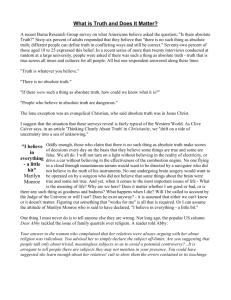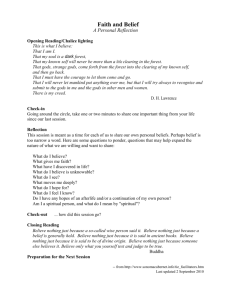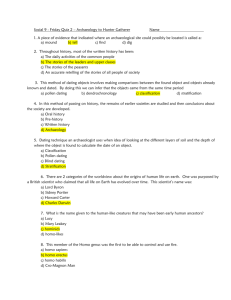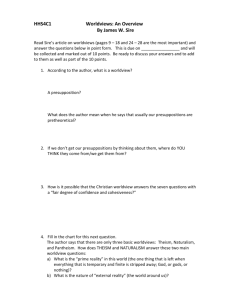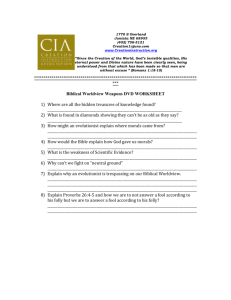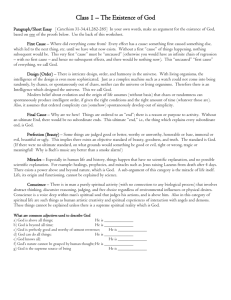Sermon Outline – MS Word
advertisement
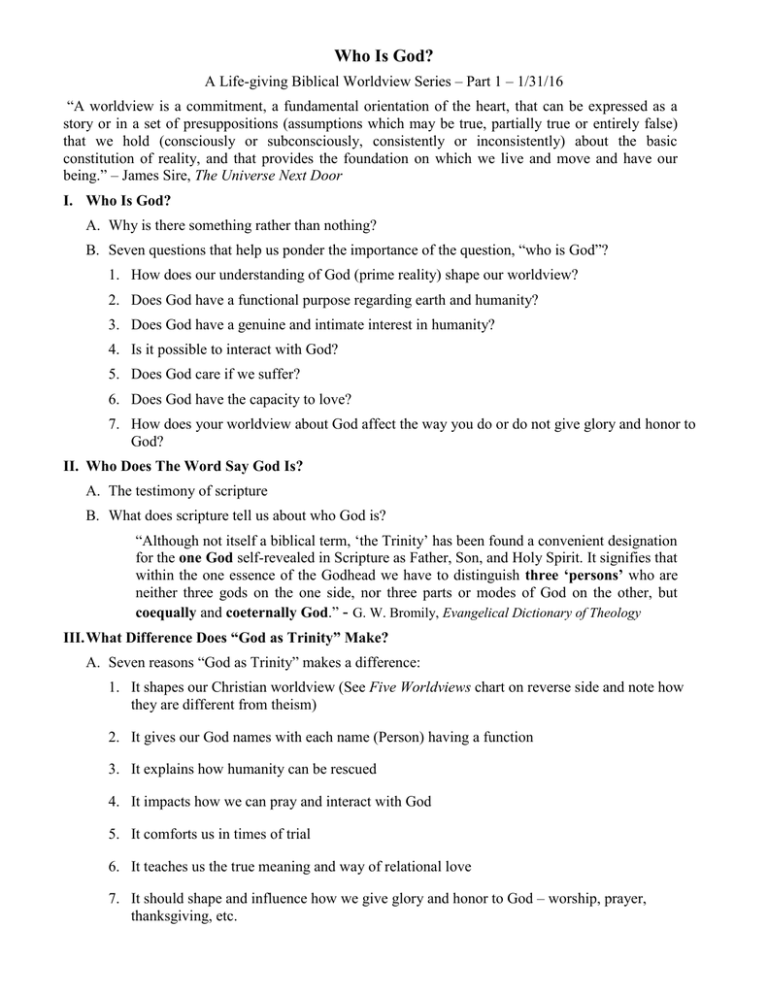
Who Is God? A Life-giving Biblical Worldview Series – Part 1 – 1/31/16 “A worldview is a commitment, a fundamental orientation of the heart, that can be expressed as a story or in a set of presuppositions (assumptions which may be true, partially true or entirely false) that we hold (consciously or subconsciously, consistently or inconsistently) about the basic constitution of reality, and that provides the foundation on which we live and move and have our being.” – James Sire, The Universe Next Door I. Who Is God? A. Why is there something rather than nothing? B. Seven questions that help us ponder the importance of the question, “who is God”? 1. How does our understanding of God (prime reality) shape our worldview? 2. Does God have a functional purpose regarding earth and humanity? 3. Does God have a genuine and intimate interest in humanity? 4. Is it possible to interact with God? 5. Does God care if we suffer? 6. Does God have the capacity to love? 7. How does your worldview about God affect the way you do or do not give glory and honor to God? II. Who Does The Word Say God Is? A. The testimony of scripture B. What does scripture tell us about who God is? “Although not itself a biblical term, ‘the Trinity’ has been found a convenient designation for the one God self-revealed in Scripture as Father, Son, and Holy Spirit. It signifies that within the one essence of the Godhead we have to distinguish three ‘persons’ who are neither three gods on the one side, nor three parts or modes of God on the other, but coequally and coeternally God.” - G. W. Bromily, Evangelical Dictionary of Theology III. What Difference Does “God as Trinity” Make? A. Seven reasons “God as Trinity” makes a difference: 1. It shapes our Christian worldview (See Five Worldviews chart on reverse side and note how they are different from theism) 2. It gives our God names with each name (Person) having a function 3. It explains how humanity can be rescued 4. It impacts how we can pray and interact with God 5. It comforts us in times of trial 6. It teaches us the true meaning and way of relational love 7. It should shape and influence how we give glory and honor to God – worship, prayer, thanksgiving, etc. Atheism Naturalism Agnosticism Existentialism much New Age Consciousness Buddhism Taoism Hinduism Pantheism Theism Christianity Islam Judaism Spiritism and Polytheism Thousands of Religions Postmodernism The material universe is all that exists. Reality is "onedimensional." There is no such thing as a soul or a spirit. Everything can be explained on the basis of natural law. Reality Humankind is the unique creation of God. People were created "in the image of God," which means that we are personal, eternal, spiritual, and biological. Man is one with ultimate reality. Thus man is spiritual, eternal, and impersonal. Man’s belief that he is an individual is illusion. Man is the chance product of a biological process of evolution. Man is entirely material. The human species will one day pass out of existence. Man Truth about the natural world is discovered through the shaman figure who has visions telling him what the gods and demons are doing and how they feel. Truth about God is known through revelation. Truth about the material world is gained via revelation and the five senses in conjunction with rational thought. Truth is an experience of unity with "the oneness" of the universe. Truth is beyond all rational description. Rational thought as it is understood in the West cannot show us reality. Truth is usually understood as scientific proof. Only that which can be observed with the five senses is accepted as real or true. Truth Moral values take the form of taboos, which are things that irritate or anger various spirits. These taboos are different from the idea of "good and evil" because it is just as important to avoid irritating evil spirits as it is good ones. Values are part of our social paradigms as well. Tolerance, freedom of expression, inclusion, and refusal to claim to have the answers are the only universal values. Moral values are the objective expression of an absolute moral being. Because ultimate reality is impersonal, many pantheistic thinkers believe that there is no real distinction between good and evil. Instead, "unenlightened" behavior is that which fails to understand essential unity. No objective values or morals exist. Morals are individual preferences or socially useful behaviors. Even social morals are subject to evolution and change. Values Five Worldviews Only the spiritual dimension exists. All else is illusion, maya. Spiritual reality, Brahman, is eternal, impersonal, and unknowable. It is possible to say that everything is a part of God, or that God is in everything and everyone. Man is a creation of the gods like the rest of the creatures on earth. Often, tribes or races have a special relationship with some gods who protect them and can punish them. Truths are mental constructs meaningful to individuals within a particular cultural paradigm. They do not apply to other paradigms. Truth is relative to one’s culture. The world is populated by spirit beings who govern what goes on. Gods and demons are the real reason behind "natural" events. Material things are real, but they have spirits associated with them and, therefore, can be interpreted spiritually. Reality must be interpreted through our language and cultural "paradigm." Therefore, reality is "socially constructed." An infinite, personal God exists. He created a finite, material world. Reality is both material and spiritual. The universe as we know it had a beginning and will have an end. Humans are nodes in a cultural reality – they are a product of their social setting. The idea that people are autonomous and free is a myth.
